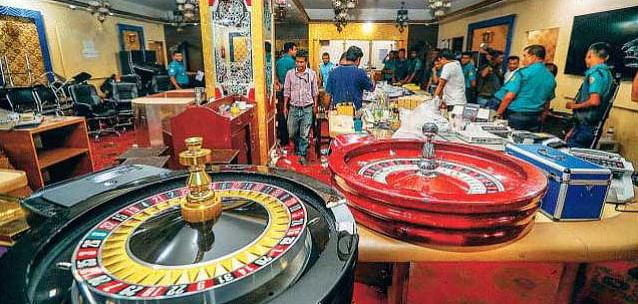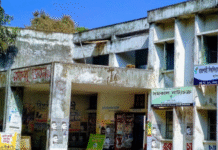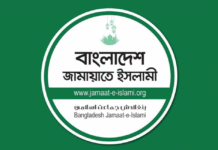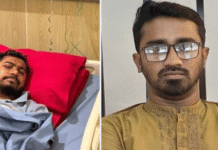
A section of leaders and activists of the ruling Awami League have become involved in all sorts of criminal activities ranging from running casinos, tender manipulations, forging documents for health sector procurement, rape, extortion and other misdeeds.
Party leaders say that an initiative is being taken to identify these elements who are using their political identity and committing crimes.
Several central leaders of Awami League, on condition of anonymity, have said that as the party has been in power for a stretch of three terms, a propensity has grown among a section of party men to resort to criminal activities, using their party identity.
They are often posing as an embarrassment to the party and the government. These leaders and activists persist in these misdeeds until some serious incident comes to light. It has emerged as a major challenge to Awami League to bring these elements under control.
Ruling party leaders said that the crackdown on casinos last year brought to light the misdeeds of certain Jubo League men. A number of them have been arrested and several have been removed from their posts. Fresh leadership was decided upon at the council. Similar steps were taken in other affiliated organisations.
In the latest incident, Awami League Dhaka-7 member of parliament Haji Salim’s son Erfan Salim assaulted a naval officer on 26 October. The MP’s son was arrested the following day. Prior to that, a young woman was gang raped on 25 September at the Sylhet MC College hostel. A case was filed against 9 persons in this regard. They are known to be Chhatra League activists, though Chhatra League has had no committee there for long. The incident led to countrywide demands for death sentence for rape. The government acquiesced to the demand and the accused have been nabbed by the police.
Thousands of committees and leaders
According to Awami League office sources, there are over 50 thousand committees in the party, from the centre down to the grassroots. And these have over 2.5 million (25 lakh) posts. The committees include 78 district committees which, in turn, include committees of the 64 districts and 12 city corporations. Under these districts, there are 622 upazila committees, 5,643 union committees, and 43,596 ward committees. Then there are units or ‘moholla’ committees under several wards, though there was no record of the exact number.
Outside of the main party Awami League, there are eight affiliated fronts of the party and two ‘brother’ organisations. These have committees right down to the grassroots level all over the country. Thousands of leaders are accommodated here too.
Awami League and its front organisations have committees overseas too. Then there are professional groups and others of the Awami League camp. The leaders and activists of these organisations also use the Awami League identity. Many followers of the central leaders are accommodated in these organisations. In many instances there is conflict between the president and the general secretary of various committees. They often pull controversial persons into their ranks to bolster their power.
Caution with the controversial elements
Jubo League, Swechchhashebok League, Krishak League, Sramik League and Matsyajibi League held councils in November last year to select new leaders in the stead of those removed. Other than Jubo League, the others have all formed full-fledged committees. Council of 31 districts including the two Dhaka cities were also held last year. The committees are being scrutinised and finalised from the centre.
Several central leaders have said that the party president, prime minister Sheikh Hasina, has strictly said that in no way can controversial persons be included within the party. Following her directives, they have begun separate meetings with leaders of the committees of the eight divisions.
Awami League joint secretary general Mahbub Ul Alam Hanif, speaking to Prothom Alo, said there were orders not to include any persons accused of misdeeds or criminal activities. However, there have been discrepancies and so the matter is now being dealt with strictly. Then again, there are many who do not have any posts but follow the leaders to gain favours. Warnings have been issued to stay alert against such elements too.
Awami League has been for long in power, many opportunists have entered the party. With no opposition at the grassroots, certain leaders and activists have grown arrogant. They are looking after their own vested interests. Those who are condoning these opportunists can in no way avoid taking responsibility for the situation either.
Government and party two separate entities
Several leaders of Awami League’s central committee have said if the government and the party could be kept separate, both would benefit. Top leaders are placing importance on consolidating the party in order to face any untoward situation in the future. Other than the president and the general secretary, there are only three ministers in the party’s present central committee. Of them, Agriculture minister Muhammad Abdur Razzaque has become presidium member again, with education minister Dipu Moni and information minister Hasan Mahmud as joint general secretaries. There are no cabinet members in the offices of the 8 division general secretaries and 19 various secretary posts.
Professor of political science at Dhaka University, Gobinda Chakraborty, told Prothom Alo that as there was no strong democratic foundation, the concept of shadow government hadn’t been created. So if the party and the government remained separate, people’s demand could be reflected in the government by means of the party.
Apprehensive of citizen’s movement
There is no strong political opposition since the 2014 election. But during its three terms in power, the government had to face four formidable civil movements. There was the Gono Jagoran Mancha in 2013 demanding that the war criminals be hanged. In 2018 there was the movement demanding reforms of the quota system in public service jobs. In the same year there was the safe roads movement. And this year the nationwide movement demanding death sentence for rape, could not be controlled politically.
Political analysts feel that these civil society movements have become complementary to the national parliament. Under pressure, the government is giving in to these demands through the administration, though such matters should be decided in parliament. There may be more such movements in the future and so Awami League is concentrating on organising the party.
Awami League leaders say that BNP tries to reap benefit from every movement, but has failed to do so. Awami League says it supports justified demands of the people and its leaders and activists also joined such movements.
No obstacle to implementing visions
Professor Gobinda Chakraborty said Awami League’s aim was to fulfill Vision 2041 and has declared ‘democracy of democracy’ to this end. There is infrastructural development, he said, but the democratic institutions were steadily deteriorating. The common people were losing faith in politics. If the opposition political parties were pushed to one side, this would gradually become an administrative state.
Awami League leaders have said that the government does not want to face any obstacle to realising Vision 2041. The government’s development is being lauded, but the activities of certain leaders and activists were tarnishing the government’s image. The party will not give any leeway in this regard. That is why the prime minister has issued stern directives to drop such controversial persons from the party. Lists of such controversial persons have been drawn up in every division.
Political scientist Harun-Or-Rashid, speaking to Prothom Alo, said as Awami League has been for long in power, many opportunists have entered the party. Also, with no opposition at the grassroots, certain leaders and activists have grown arrogant. They are looking after their own vested interests. But those who are condoning these opportunists can in no way avoid taking responsibility for the situation either.
*This report appeared in the print and online edition of Prothom Alo and has been rewritten for the English edition by Ayesha Kabir









